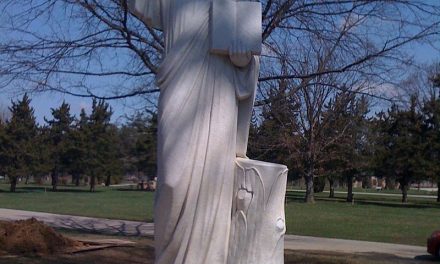Acts 2: 14, 36-41
Psalm 23
1 Peter 2:20-25
John 10:1-10
“Listen” is the first word of the Rule of St. Benedict, which he wrote for the monks of the 6th century and which is still the foundation of many monastic orders today – “Listen…with the ear of your heart.”
Likewise, the theme of listening is repeated throughout the readings for this coming Sunday, the Fourth Sunday of Easter. In the reading from the Gospel of John the sheep recognize Jesus as their shepherd primarily through listening to his voice – “the sheep follow him because because they know his voice” (Jn 10:4). We have seen that their are other ways of recognizing Jesus – such as the two disciples on the road to Emmaus who recognize Jesus in the breaking of the bread (Luke 24) – but in this reading John emphasizes listening and hearing.
The Gospel of John is rich in metaphorical language which the author of the Gospel repeatedly uses to tip his readers off to what is happening. For example, the characters in the fourth Gospel are carefully distinguished between those who “know” and those who “do not know” the true identity of Jesus – when the Jews (presumably members of the Sanhedrin) interrogate the man born blind whom Jesus healed they claim: “We know that God has spoken to Moses, but as for this man [Jesus], we do not know where he comes from” (Jn 9:9). But for those who are in the know, Jesus tells them directly, “I came from the Father and have come into the world; again, I am leaving the world and going to the Father” (Jn 16:28). Therefore, in John’s Gospel the process of listening and knowing to whom to listen are integral to one’s identity as a follower of Jesus, the Good Shepherd. Moreover, since Jesus is depicted as the divine Word [Logos] himself (Jn 1:1), it follows that coming to know Jesus as the Word of God would require an act of careful listening to the voice of the Shepherd.
This same pattern of listening and knowing is taken up in the first reading from the book of Acts as well. Peter stands up to speak to those present at Pentecost and assures the crowds that although they are speaking in tongues, they are not drunk. Rather, he admonishes them by saying “let this be known to you, and listen to what I say…let the entire house of Israel know with certainty that God has made him both Lord and Messiah, this Jesus whom you crucified” (Acts 2:14, 36). It is through hearing Peter’s testimony and coming to know Jesus as the resurrected Messiah that thousands of persons were baptized on that very first Pentecost.
The author of the first letter of Peter adds an important dimension to our theme as well in reminding us that listening and knowing are not simply an end in themselves, but are a foundation for the kind of endurance that is required to stay true to the Gospel. Living in a (at least nominally) Christian culture, it may be difficult to appreciate the challenges that early Christians faced in publicly acknowledging Jesus as the Messiah. Even prior to the persecutions under the auspices of the Roman empire, Christians were forced out of the synagogues where they first gathered to worship, and Gentile Christians were likely looked upon with suspicion for joining this new, weird sect of “Christians.” It is into this early context that the author of 1 Peter exhorts his hearers to endure suffering for doing what is right (1 Pet 2:20), following the example set forth by Jesus himself.
This, it seems to me, is precisely the task of moral theology; that is, to discern what kinds of right actions or virtues that Christians are called to endure as a direct result of listening to the Word (I mean this in both senses of the ‘word’; in reference to Jesus himself, but also in reference to the word of God in Scripture), and of coming to know the true source of that Word as a loving revelation of God. On this point, it is interesting to note that in 1 Peter, the author exhorts Christians to live peaceably in whatever social context in which they find themselves, but to be a consistent witness to Christ through their endurance in faith and the works that flow from it. Moral theologians have been known to spill a good amount of ink over whether or how Christian ethics should or should not be “sectarian” from the rest of society (as in Gustafson’s famous paper on the “sectarian temptation”), or whether or not Christians can engage in the mechanisms of the modern state or warfare. These are important questions that need to be asked, but it seems to me that more often than not life presents us with plenty of opportunities to discern a course of action that may inadvertently be a “stumbling block” to others, leading them to question why a Christian would do such a thing, and in that process perhaps come to hear and know the Shepherd’s voice through even the smallest of action done with faith and endurance.




